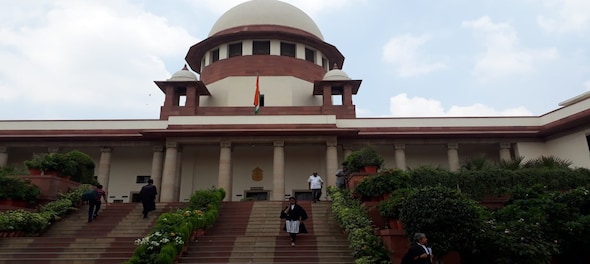
The Supreme Court Collegium yet again voiced its concern over the Centre allegedly withholding or overlooking the names recommended for appointment as judges. It said on Wednesday the delay on part of the government disturbs the seniority of the candidates.
The Collegium raised its concern in a resolution in which it recommended the names of four district judges — R Sakthivel, P Dhanabal, Chinnasamy Kumarappan, and K Rajasekar — for appointment as judges of the Madras High Court.
"The names which have been recommended earlier in point of time including the reiterated names ought not to be withheld or overlooked as this disturbs their seniority whereas those recommended later steal march on them. Loss of seniority of candidates recommended earlier in point of time has been noted by the collegium and is a matter of grave concern," the news agency PTI reported while citing excerpts from the resolution.
The Collegium further asked the government to take "necessary action" for the elevation of those selected earlier.
The remarks by the Collegium came in the backdrop of the ongoing tussle between the Centre and the judiciary over the Collegium system of appointing judges in the Supreme Court and high courts.
What's the latest on the Collegium Vs Centre debate?
Chief Justice of India (CJI) DY Chandrachud, who heads the Collegium, defended the system saying that not every system is perfect but the current Collegium system is the "best" mechanism developed by the judiciary to maintain its independence.
"The object of this system was to maintain independence which is a cardinal value. We have to insulate the judiciary from outside influences if the judiciary has to be independent. That is the underlying feature of Collegium," Justice Chandrachud was quoted by PTI as saying.
The CJI was speaking at the India Today Conclave on Saturday, just hours after Law minister Kiren Rijiju criticised the selection process while speaking at the same forum.
Rijiju reportedly asserted that as per the Constitution, the appointment of judges is the duty of the government. He added that the appointment of judges was not judicial work but "purely administrative in nature".
Meanwhile, Justice Chandrachud's predecessor Justice UU Lalit also supported the Collegium process, calling it an "ideal system". However, another former CJI SA Bobde favoured the primacy of the judiciary but was of the view that the government's opinion was vital, PTI reported.
Status of SC, HC vacancies
Law Minister Kiren Rijiju informed the Rajya Sabha on March 16 that against 334 vacancies in various high courts, 118 recommendations made by High Court collegiums are at various stages of processing, while the government is yet to receive recommendations for 216 vacancies of judges.
He further said there was no vacancy in the Supreme Court as on March 10. In the 25 high courts, against the sanctioned strength of 1,114 judges, 780 judges were working, with a shortfall of 334.
The government, he said, is committed to filling up of vacancy expeditiously in a time-bound manner.
Govt's representative's role in appointing judges
Kiren Rijiju had also told Parliament that the government has emphasised on the need to finalise the Memorandum of Procedure (MoP) in its communication on January 6 this year to the Supreme Court.
The government had suggested that the Search-cum-Evaluation Committee, in respect of the appointment of judges in the Supreme Court and Chief Justices of High Courts, should also consist of a representative nominated by the Government of India.
The MoP is a set of documents which guide the transfer, elevation and appointment of Supreme Court and HC judges.
Rijiju has often batted for a more transparent system for the appointment and transfer of judges in the Supreme Court and high courts. However, the Supreme Court lawyers have been largely against the interference of the government in the system.
The delayed appointments
In a March 21 resolution, Chief Justice DY Chandrachud, who heads the Collegium, said a notification for the elevation of persons recommended earlier should be issued at the earliest, PTI reported.
The name of Advocate R John Sathyan was reiterated by the Collegium on January 17 this year. The Collegium reiterated its February 16, 2022 recommendation for appointing Sathyan as a judge of the Madras High Court.
In the March 21 resolution, the Collegium also reiterated its July 25, 2022 recommendation for the appointment of Senior Advocate Harpreet Singh Brar as a judge of the Punjab and Haryana High Court.
According to the report, the Collegium of the High Court of Punjab and Haryana had recommended Brar's elevation on March 10, 2022, which was approved by the Supreme Court body on July 25, 2022.
The resolution said the Department of Justice flagged certain issues and referred back to the recommendation on November 25, 2022, for reconsideration.
(With inputs from PTI)
(Edited by : Pradeep John)
First Published: Mar 23, 2023 3:28 PM IST
Check out our in-depth Market Coverage, Business News & get real-time Stock Market Updates on CNBC-TV18. Also, Watch our channels CNBC-TV18, CNBC Awaaz and CNBC Bajar Live on-the-go!


Punjab Lok Sabha elections: Check full list of AAP candidates and constituencies
May 18, 2024 12:59 PM
PM Modi, Rahul Gandhi election rallies in Delhi today: Here are the routes to avoid
May 18, 2024 11:28 AM

